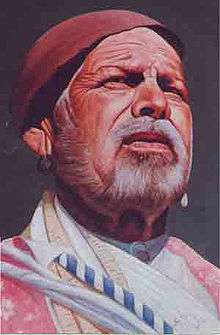Gadge Maharaj

Debuji Zhingraji Janarkar (23 February 1876 – 20 December 1956), popularly known as Sant Gadge Maharaj or Gadge Baba, was a saintly social reformer, a wandering mendicant who held weekly festivals with the help of his disciples across what is now the Indian state of Maharashtra. His reforms and visions for villages in India are still a source of inspiration for various political parties and non-government organizations.
Life and career
His original name was Debuji Zhingraji Janorkar. He was born in Shendgaon village in Anjangaon Surji Taluka in Amravati District of Maharashtra to a Dhobi family. A public teacher, he travelled from one place to another wearing his food pan upturned on his head and carrying his trademark broom. When he entered a village, he would instantly start cleaning the gutters and roads of the village. He also told the citizens of the village that their congratulations would have to wait until his work was done. Villagers gave him money, babaji used that for progress of physical as well as thinking of society. From the obtained money, Maharaj built educational institutions, dharmashalas, hospitals and animal shelters.
He conducted his discourses in the form of "Kirtans" in which he would emphasize values like service to humanity and compassion. During his Kirtans, he would educate people against blind faiths and rituals. He would use Dohas (couplets of a song) by Saint Kabir in his discourses.
He exhorted people to stop animal sacrifice as part of religious rituals and campaigned against vices such as alcohol abuse.
He tried to embody the values that he preached: hard work, simple living and selfless service to the poor. He abandoned his family (a wife and three children) to pursue this path.[1]
Maharaj met the spiritual teacher Meher Baba several times. Meher Baba indicated that Maharaj was one of his favourite saints[2] and that Maharaj was on the sixth plane of consciousness.[3] Maharaj invited Meher Baba to Pandharpur, India, and on 6 November 1954 thousands
of people had Maharaj and Meher Baba's darshan.[4]
Death and legacy
Maharaj died on 20 December 1956 on his way to Amravati, on the banks of river Pedhi near Walgaon. The Government of Maharashtra started the Sant Gadge baba Gram Swachata Abhiyan project in 2000-01 in his honour. This programme awards prizes to villagers, who maintain clean villages. In addition, the Government of India instituted a National Award for Sanitation and Water in his honour.[5]
The University of Amravati has also been named in his honour.
References
- ↑ G.N. Dandekar (2009). Shree Gadge Maharaj. Translated by P.J. Godbole. Published by Mrunmayee Prakashan.
- ↑ Kalchuri, Bhau (1986). Meher Prabhu: Lord Meher. 14. Myrtle Beach: Manifestation, Inc. pp. 4924.
- ↑ Kalchuri, Bhau (1986). Meher Prabhu: Lord Meher. 1. Myrtle Beach: Manifestation, Inc. p.190.
- ↑ Kalchuri, Bhau (1986). Meher Prabhu: Lord Meher. 13. Myrtle Beach: Manifestation, Inc. pp. 4571-77.
- ↑ http://118.102.190.94/mwg-internal/de5fs23hu73ds/progress?id=0AF6HGcIxY&Cancel=1 Info about the 'abhiyan'
External links
[[Category:rrr Marathi people]]